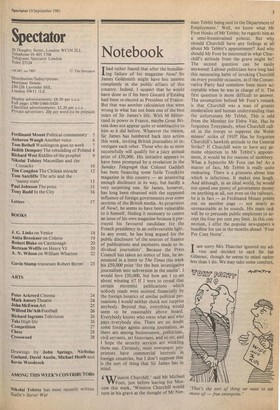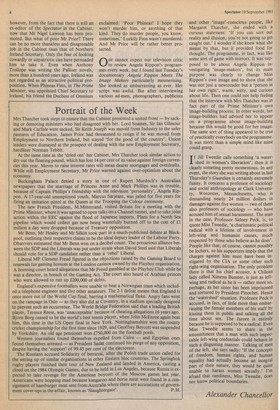Notebook
Ihad rather feared that after the humiliating failure of his magazine Now! Sir James Goldsmith might have lost interest completely in the public affairs of this country. Indeed, I suspect that he would have done so if his hero Giscard d'Estaing had been re-elected as President of France. But that was another calculation that went wrong in what has not been one of the best years of Sir James's life. With M Mitterrand in power in France, maybe Great Britain does not appear quite so unattractive to him as it did before. Whatever the reason, Sir James has lumbered back into action this week, inviting British journalists to investigate each other. Those who do so most successfully will qualify for a juicy annual prize of £50,000. His initiative appears to have been prompted by a revelation in the Sunday Telegraph that Colonel Gaddafi has been financing some futile Trotskyist magazine in this country — an interesting enough disclosure in its way, but hardly a very surprising one. Sir James, however, has long been obsessed with the supposed influence of foreign governments over some sections of the British media. As proprietor of Now!, he seems to have been vulnerable to it himself, finding it necessary to censor an issue of his own magazine because it portrayed his favoured candidate for the French presidency in an unfavourable light. In any event, he has long argued for the public disclosure 'of the sources of finance of publications and payments made to individual journalists'. Because the Press Council has taken no notice of him, he announced in a letter to The Times this week his £50,000 prize 'for the best investigative journalism into subversion in the media'. I would love £50,000, but how am I to set about winning it? If I were to reveal that certain extremist publications which nobody reads were assisted financially by the foreign lunatics of similar political persuasions I would neither shock nor surprise anybody. Beyond that, everything would seem to be reasonably above board. Everybody knows who owns what and who pays everybody else. There are no doubt some foreign agents among journalists, as there are among businessmen, politicians, civil servants, art historians, and so on; and I hope the security services are winkling them out. Certainly, most newspaper proprietors have commercial interests in foreign countries, but I don't suppose that is the sort of thing that Sir James has in mind.
6inston Churchill,' said Mr Michael WFoot, just before leaving for Moscow this week, 'Winston Churchill would turn in his grave at the thought of Mr Nor
man Tebbit being sent to the Department of Employment.' Well, we know what Mr Foot thinks of Mr Tebbit; he regards him as a semi-housetrained polecat. But why should Churchill have any feelings at all about Mr Tebbit's appointment? And why should Mr Foot be interested in what Churchill's attitude from the grave might be? The second question can be easily answered: Labour politicians have long had this nauseating habit of invoking Churchill on every possible occasion, as if the Conservative Party had somehow been more acceptable when he was in charge of it. The first question is more difficult to answer. The assumption behind Mr Foot's remark is that Churchill was a man of greater moderation and human understanding than the unfortunate Mr Tebbit. This is odd from the Member for Ebbw Vale. Has he forgotten Tonypandy, when Churchill called in the troops to suppress the Welsh miners' strike of 1910? Has he forgotten Churchill's hawkish attitude to the General Strike? If Churchill were to have any genuine objection to Mr Tebbit's appointment, it would be for reasons of snobbery. What a hypocrite Mr Foot can be! As a matter of fact, Mr Tebbit is really quite endearing. There is a grimness about him which is infectious. It makes one laugh. And although, in an ideal world, he would not spend one penny of government money on anything at all, not even on the railways, he is in fact — as Ferdinand Mount points out on another page — not nearly as unreasonable as he sounds. His main task will be to persuade public employees to accept the four per cent pay limit. In this connection, I offer the popular newspapers a headline for use in the months ahead: 'Four Per Cent Norm'.
T am sorry Mrs Thatcher ignored my ad1 vice and decided to sack Sir Ian Gilmour, though he seems to mind rather less than I do. We may take some comfort, however, from the fact that there is still an ex-editor of the Spectator in the Cabinet, now that Mr Nigel Lawson has been promoted. But what of poor Mr Prior? There can be no more thankless and disagreeable job in the Cabinet than that of Northern Ireland Secretary. Only the fear of looking cowardly or unpatriotic can have persuaded him to take it. Even when Anthony Trollope was writing the Palliser novels, more than a hundred years ago, Ireland was not regarded as an attractive political proposition. When Phineas Finn, in The Prime Minister, was appointed Chief Secretary to Ireland, his friend the Duchess of Omnium exclaimed: 'Poor Phineas! I hope they won't murder him, or anything of that kind. They do murder people, you know, sometimes.' Luckily Finn wasn't murdered. And Mr Prior will be rather better protected.
One cannot expect our television critic to review Angela Rippon's programmes every week, but I found last Tuesday's documentary Angela Rippon Meets The Image Makers particularly mesmerising. She looked as embarrassing as ever. Her script was awful. But after interviewing various ad-men, photographers, publicists and other 'image'-conscious people, like Margaret Thatcher, she ended with a curious statement: 'If you can sort out reality and illusion, you're not going to get caught out.' I wonder if she knew what she meant by that, but it provided food for thought. The programme, in fact, was like some sort of game with mirrors. It was supposed to be about Angela Rippon investigating 'image-makers', but its main purpose was clearly to change Miss Rippon's own image and to show that she was not just a newsreader but a 'person in her own right', warm, witty, and curious about life. Then one could not help feeling that the interview with Mrs Thatcher was in fact part of the Prime Minister's own image-building process. In other words, her image-builders had advised her to appear on a programme about image-building because this would be good for her image. The same sort of thing appeared to be true of practically everybody on the programme. It was more than a simple mind like mine could grasp.
T f Jill Tweedie calls something 'a water shed in women's liberation', then it is clearly someting pretty momentous. In any event, the story she was writing about in last Thursday's Guardian is certainly extremely funny. It concerns a professor of sociology and social anthropology at Clark University, Worcester, Massachusetts, who is demanding nearly 24 million dollars in damages against five women — two of them also professors of sociology — who have accused him of sexual harassment. The man in the case, Professor Sidney Peck, is, to quote Miss Tweedie, 'a charismatic political radical with a lifetime of involvement in left-wing and humanist causes, much respected by those who believe as he does'. People like that, of course, cannot possibly be lechers, so his supporters imply that the charges against him must have been instigated by the CIA or some other such right-wing organisation. The only problem there is that his chief accuser, a Chilean lady called Ximena Bunster, is just as leftwing and radical as he is — rather more so, perhaps, as her sister has been imprisoned and tortured by President Pinochet. Hence the 'watershed' situation. Professor Peck is accused, in fact, of little more than embarrassing the female members of his staff by kissing them in public and talking all the time about sex. The furore is entirely because he is supposed to be a radical. Even Miss Tweedie seems to share in the astonishment that a man with such impeccable left-wing credentials could behave in such a disgusting manner. Talking of men of the left, she says sadly: 'If the concepts of freedom, human rights, and human equality had actually become an integral part of their nature, they would be quite unable to harass women sexually.' I'm afraid that randiness, Miss Tweedie, does not know political boundaries.
Alexander Chancellor



































 Previous page
Previous page